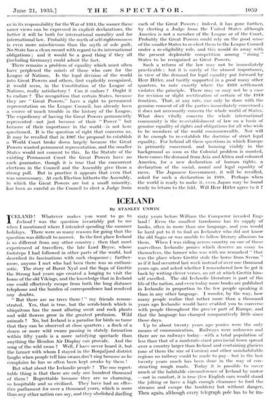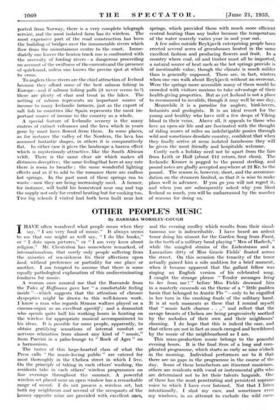ICELAND
By STANLEY UNWIN
ICELAND ! Whatever makes you want to go to Iceland? was the question invariably put to me when I mentioned where I intended spending the summer holidays. There were so many reasons for going that the question was difficult to answer. In the first place Iceland is so different from any other country ; then that most experienced of travellers, the late Lord Bryce, whose footsteps I had followed in other parts of the world, had described its fascinations with such eloquence ; further- more, anyone I met who had been there was so enthusi- astic. The story of Burnt Nyal and the Saga of Grettir the Strong had years ago created a longing to visit the home of the old Vikings, and the knowledge that in Iceland one could effectively escape from both the long distance telephone and the burden of correspondence had resolved any doubts.
" But there are no trees there ! " my friends remon- strated. Yes, that is true, but the scrub-birch which is ubiquitous has the most alluring scent and rock plants and wild flowers grow in the greatest profusion. Wild animals ? No, but Iceland is a paradise for birds so tame that they can be observed at close quarters ; a flock of a dozen or more wild swans passing in stately formation within fifty yards is a more satisfying spectacle than anything the Hendon Air Display can provide. And the song of the wild swan ? Well, I have never heard it, but the farmer with whom I stayed in the Borgafjord district laughs when people tell him swans don't sing because as he complains he has so often been kept awake by them !
But what about the Icelandic people ? The one regret- table thing is that there are only one hundred thousand of them ! Regrettable because they are so charming, so hospitable and so civilized. They have had an effec- tive parliament for over a thousand years, which is more than any other nation can say, and they abolished duelling sixty years before William the Conqueror invaded Elig.r land ! Even the smallest farmhouse has its supply of books, often in more than one language, and you would be hard put to it to find an Icelander who did not know the old Sagas or was unable to follow literary allusions to them. When I was riding across country on one of those marvellous Icelandic ponies which deserve an essay to themselves, the farmer who was with me remarked " that was the place where Grettir stole the horse from Svenn " as if it had occurred last week instead of over one thousand years ago, and asked whether I remembered how he got it back by writing clever verses, an art at which Grettir him- self excelled. The old Icelandic literature is part of the life of the nation, and even today more books are published in Icelandic in proportion to the few people speaking it than in any other language. I wonder, by the way, how many people realize that rather more than a thousand years ago Icelandic would have (Tabled you to converse with people throughout the grea ter part of Europe, and that the language has changed comparatively little since those days.
Up to about twenty years ago ponies were the only means of communication. Railways were unknown and there are no railways today—with a total population of less than that of a moderate-sized provincial town spread over a country larger than Ireland and containing glaciers (one of them the size of Corsica) and other uninhabitable regions no railway could be made to pay--but in the last twenty years much has been done in the way of con- structing rough roads. Today it is possible to cover much of the habitable circumference of Iceland by motor —not in comfort, it is true (few English cars would stand the jolting or have a high enough clearance to ford the streams and escape the boulders) but without danger. Then again, although every telegraph pole has to be inn- ported from Norway, there is a very complete telegraph service, and the most isolated farm has its' wireless. The most expensive part of the road construction has been the building of bridges over the innumerable rivers which flow from the mountainous centre to the coast. Imme- diately one leaves the beaten track one is confronted with the necessity of fording rivers—a dangerous proceeding on account of the swiftness of the currents and the presence -of quicksand, unless one knows the precise spot at which to cross.
To anglers these rivers are the chief attraction of Iceland because they afford some of the best salmon fishing in Europe—and if salmon fishing palls (it never seems to !) there are plenty of char and trout in the lakes. The netting of salmon represents an important source of income to many Icelandic farmers, just as the export of salt fish to countries like Spain represents the most im- portant source of income to the country as a whole.
A special feature of Icelandic scenery is the many craters of extinct volcanoes and the lava which in years gone by must have flowed from them. In some places, as for instance the valley of the Nordera, the lava has assumed fantastic shapes, in others it is comparatively flat. In either case it gives the landscape a barren effect .which is mysteriously attractive. like the South African veldt. There is the same clear air which makes all distances deceptive; the same feeling that here at any rate there is room to breathe ; the same wonderful lighting effects and as if to add to the romance there are endless hot springs. In the past most of these springs ran to waste—now they are being increasingly used. A farmer, for instance, will build his homestead near one and tap the supply not only for central heating but for cooking too. Two big schools I visited had both been built near hot springs, which provided them with much more efficient central heating than any boiler because the temperature of the water scarcely varies year in and year out.
A few miles outside Reykjavik enterprising people have erected several acres of greenhouses heated in the same excellent fashion and producing flowers and fruit. In- a country where coal, oil and timber must all be imported, a natural source of heat such as the hot springs provide is of inestimable value, though the climate is much milder than is generally supposed. There are, in fact, winters when one can walk about Reykjavik-without an overcoat. Were the springs more accessible many of them would be crowded with visitors anxious to take advantage of their health-giving properties. - But as yet Iceland is not a place to recommend to invalids, though it may well be one day.
Meanwhile it is a paradise for anglers, bird-lovers, botanists and geologists. It is an ideal resort for the young and healthy who have still a few drops of Viking blood in their veins. Above all, it appeals to those who love an open-air life and are fascinated with the thought of riding scores of miles on indefatigable ponies through wild and sometimes desolate country, confident that when they finally arrive at some isolated farmhouse they will be given the most friendly and hospitable welcome.
Costly such a holiday need not be apart from the fare from Leith or Hull (about £12 return, first class). The Icelandic Kroner is pegged to the pound sterling, and pound notes are gladly accepted anywhere at 22 Kr. to the pound. The season is, however, short, and the accommo- dation on the steamers limited, so that it is wise to make plans well in advance. If you go you will not regret it, and when you are subsequently asked why you liked Iceland so much, you will be embarrassed by the number of reasons for doing so.









































 Previous page
Previous page